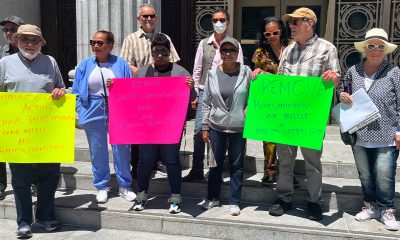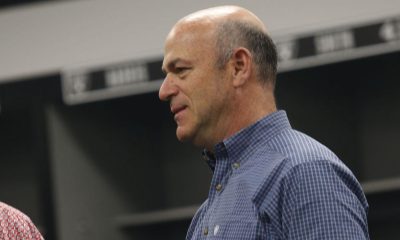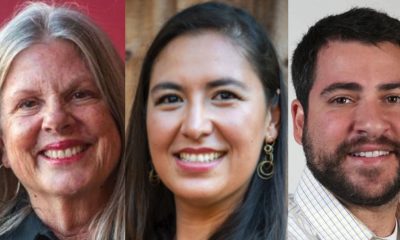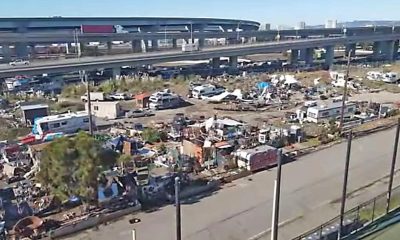City Government
After Miscommunication Over Plan, City Relocates Unhoused North Oakland Residents
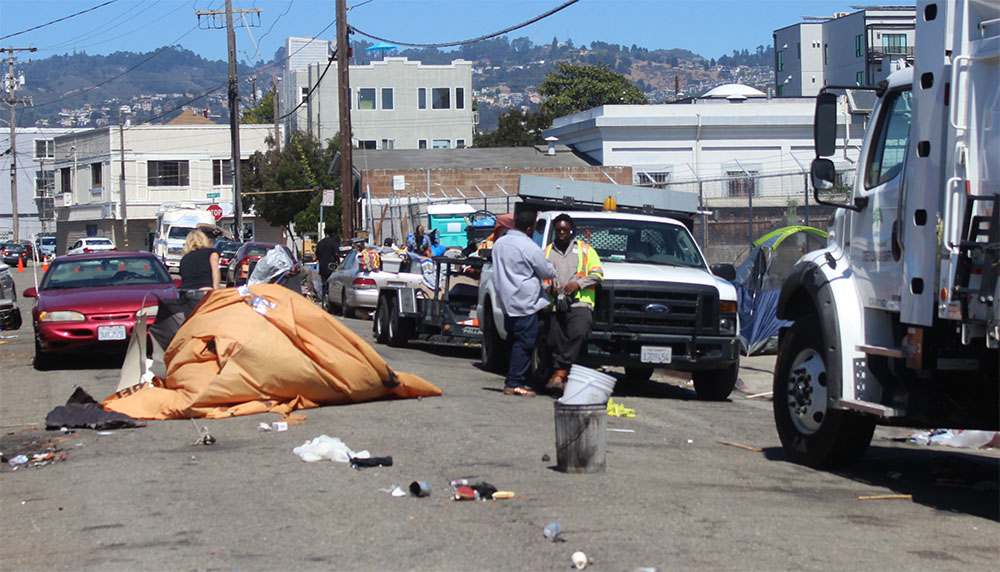
On Aug. 27-28, The City of Oakland cleared five residents who were living in tents from Manila Avenue near Mosswood Park, but allowed them to move 300-400 feet north.
The City also conducted a deep cleaning on Manila Avenue between 38th and 40th streets, in an operation that directly affected about 15 unhoused people living in the area.
Prior to the day of the clearance, the City’s plans were still unclear to unhoused residents in the area and advocates.
The City began the relocation operation on August 21 by placing pink “notice to vacate an illegal encampment” flyers near the five residents and throughout the surrounding area where other unhoused residents, who later were not required to move, lived. Then, on August 24, the Oakland Police Dept. placed orange parking violation stickers on RVs and vehicles that serve as people’s homes in the area, instructing them to move their vehicles by Aug. 27 or face impoundment.
But just before 4:00 p.m. on Aug. 24, Oakland’s Homelessness Administrator Daryel Dunston sent an e-mail to City Council members, City administrators and members of Mayor Libby Schaaf’s media team, which set out plans that contradicted the original flyers and notices.
“I am writing to clear up any miscommunication regarding the encampment operation scheduled tomorrow at 38th & Manila,” reads the e-mail, which stated that the City “will be conducting a cleaning.”
“No one’s vehicle dwelling will be towed,” Dunston wrote and specified that only people living within a small “collapse zone” of a building set to be demolished would be relocated.
Five people living in tents and one person living in a vehicle lived in the collapse zone and the City forced them to move on Aug. 27. On the same day, the City did a deep cleaning of the east side of Manila Avenue, which required residents to temporarily move their belongings or have them discarded.
Until the day of the operation, neither the City nor OPD informed residents that the plans initially stated on the flyers or parking violation stickers would not be carried out.
One resident said he thought they had to leave and drove his vehicle around the corner a day before the operation. He described the move as easy but he also noted that his neighbor, whose vehicle did not run, arranged a tow to keep her home safe, an expense and an effort that ended up being unnecessary.
During the clean-up and relocation operation, some residents said they felt rushed and that the City did not give them adequate time to safely move their belongings. One resident lost a prescription for his dog. Another resident’s tent was damaged while she was relocating. A local grassroots organization, the North Oakland Restorative Justice Council, brought her a replacement tent the next day.
About 25 residents, most of whom were housed, showed up on August 27 to help residents with the move and clean-up, including some people from the neighborhood and others from East and West Oakland.
About a half dozen showed up on August 28, when the City did a smaller clean-up operation on the west side of Manila Avenue and no one was moved. One resident reported losing her living room on Friday after the city forced her to remove a tent from a seldom-used sidewalk. She now lives exclusively in her vehicle.
“I showed up to help people move their stuff and protect their rights because often times if they’re left alone, [the City], can steamroll people,” said Colleen Donovan, a 26-year-old Oakland resident and member of the United Front Against Displacement, a mutual aid and housing justice grassroots organization. “It helps when there’s pressure and [the City] realizes housed residents of Oakland are paying attention.”
Several police cars and officers were present who monitored but did not engage with any unhoused residents.
Residents questioned why the operation was scheduled while wildfires throughout California had caused smoke to blow into Oakland, at times making the air quality unhealthy.
“The air is trash,” Amber Rockwood, a housed neighbor in the area wrote on Twitter after seeing City workers posting flyers. “How are they really gonna evict some houseless people during all this.”
During the first day of the City operation, AirNow classified the air quality as “moderate,” but during the clean-up on the second day, AirNow classified the air quality as “unhealthy.” The City did not provide workers or unhoused people with N95 masks as they moved possessions and disposed of trash outside for several hours.
The Oakland Post has chosen not to name the unhoused residents in this area, many of whom have claimed that publicizing their unhoused status could make it difficult for them to receive housing or employment in the future.
Activism
Oakland Post: Week of April 17 – 23, 2024
The printed Weekly Edition of the Oakland Post: Week of April 17 – 23, 2024

To enlarge your view of this issue, use the slider, magnifying glass icon or full page icon in the lower right corner of the browser window. ![]()
Bay Area
Oakland Finishes Final Draft of Downtown Specific Plan for Potential City Improvements
In late March, Oakland’s city administration announced the final draft of their Downtown Specific Plan, a blueprint for city improvements and developments over the next 20 years. The comprehensive 474-page plan lays out policies for downtown developments that will increase economic, social and cultural, and communal opportunities for residents and workers who frequent this essential hub in Oakland.
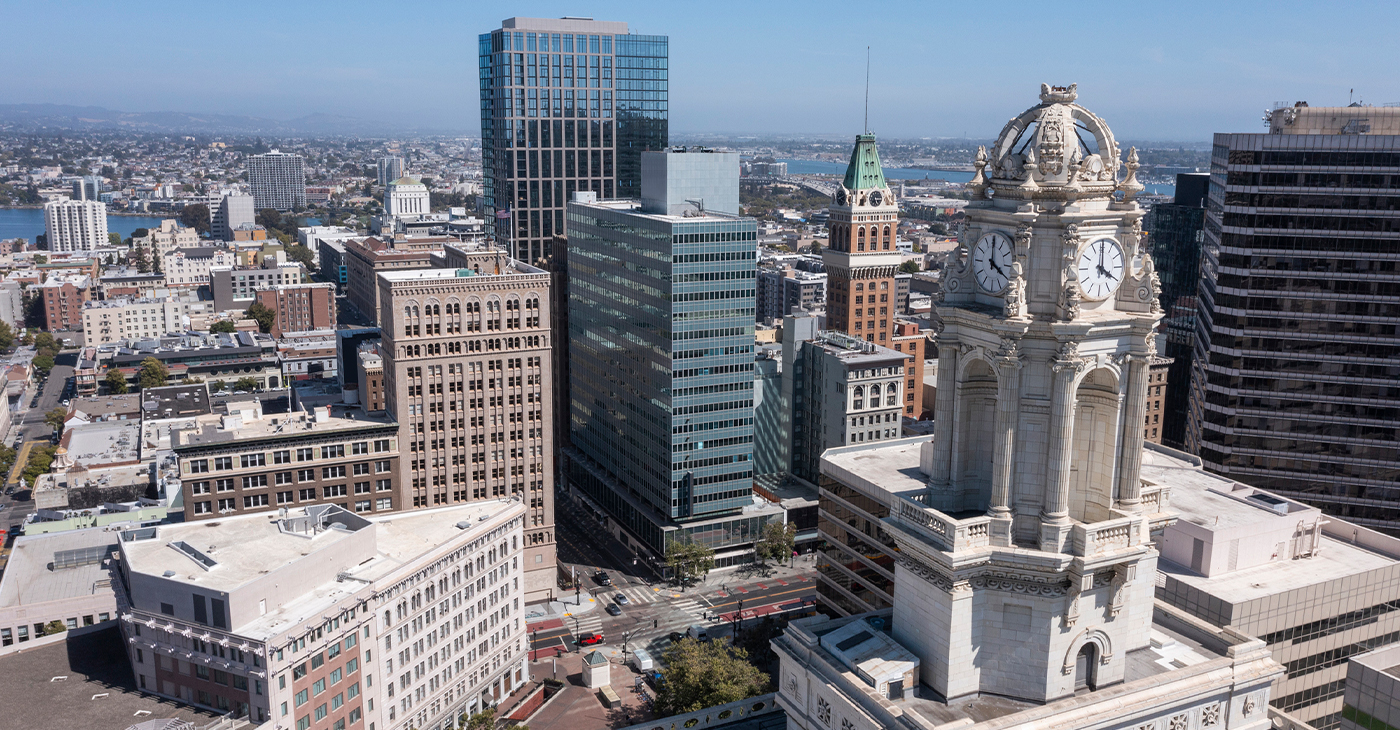
By Magaly Muñoz
In late March, Oakland’s city administration announced the final draft of their Downtown Specific Plan, a blueprint for city improvements and developments over the next 20 years.
The comprehensive 474-page plan lays out policies for downtown developments that will increase economic, social and cultural, and communal opportunities for residents and workers who frequent this essential hub in Oakland.
Several departments over the course of eight years developed the plan, with two phases that emphasized a need for community input from local stakeholders, such as leaders and residents, and a focus on the role of social and racial equity in past and future developments.
Throughout the extensive plan, the concept of equity for marginalized communities is embedded with each goal and priority for the improvements to downtown. It acknowledges that social and racial barriers are preventing these communities from thriving on an equal playing field.
The authors identified six key disparities, or ‘equity indicators’, that set the baseline for how success will be measured for the improvements. These indicators include the burden of housing costs, homelessness, displacement, disconnected youth, unemployment rate and median income.
The plan is also broken up into chapters, each describing a major issue or topic that is plaguing downtown residents and workers, such as mobility, culture preservation, community health and sustainability, and land use and urban design.
Within each chapter, the authors dedicate a section to the impacts of the COVID-19 pandemic for the various areas of interest, illustrating how disparities and inequities increased before and after the disease’s peak.
Two major issues highlighted in the plan are economic opportunity and housing and homelessness. Both of these issues have been aggravated by the pandemic and require substantial support and resources to move forward.
Many reports coming out of the commercial and residential districts downtown have blamed the rise in crime and cost of living as reasons for leaving Oakland for other cities or closing down indefinitely.
The plan attributes rising rents of both residential and commercial properties to the displacement of local businesses and entrepreneurs. Downtown also has an imbalance in the jobs to housing ratio, which limits access to jobs as commuting distances increase.
Other concerns for the local economy are barriers to employment opportunities for workers of color, non-English speakers, and those with limited access to transportation. As stated in the plan, downtown also has a lack of vacancies near public transit hubs, such as BART, bus stops or ferry terminals, which could save workers money and time for their commutes into the city.
According to the downtown plan, the average unemployment rate for the white population was 5.9%, but the Asian population was at 6.7%, and for the Black population it was even higher at 10.4%.
The proposed solutions for the lack of economic prosperity include providing assistance to local businesses owned by people of color, reinforcing downtown as the ‘place to be’ for nightlife entertainment, and building businesses closer to public transit.
The addition of over 18.3 million (m) sq. ft. of new commercial space, 1.3m sq. ft. of new institutional space, and 500,000 sq. ft. of new industrial space, could potentially create almost 57,000 jobs downtown.
Housing and homelessness, issues closely tied to economic prosperity, are top concerns for Oakland residents. High rents have led to displacement and homelessness for those unable to keep up with the rising costs of the Bay Area.
Over 5,000 people are currently experiencing homelessness in Oakland, according to 2022 Point In Time data. 60% of this population is Black despite only making up nearly 20% of the total city population.
The plan explains that by adding nearly 29,000 new homes and expanding affordable housing units across the city by 2040, this would help alleviate the stress of obtaining and affording a home.
Strategies proposed to tackle the housing and homelessness crisis include increasing renter protections, providing additional shelters and services for homeless residents, and promoting homeownership in downtown with first-time buyer assistance and proactive assistance to vulnerable homeowners.
The plan acknowledges that the implementation of changes and developments amongst the several concerns outlined in the document will take time, both in short and long term periods.
To better explain how and when each project will be addressed over the course of the next two decades, a detailed 123-page graph shows which agencies, potential funding sources, and costs come with the goals.
The Oakland Planning Commission and Landmarks Preservation Advisory Board will each hold public hearings regarding the final draft of the Downtown Plan in May and June.
City Government
LAO Releases Report on Racial and Ethnic Disparities in California Child Welfare System
Racial inequalities in California’s child welfare system disproportionately impact poor Black and Native American children, according to a report released April 3 by the nonpartisan Legislative Analyst’s Office (LAO). The report, which was presented to the Assembly Subcommittee No. 2 on Human Services — chaired by Assemblymember Corey Jackson (D-Moreno Valley) — states that the proportion of low-income Black and Native American children in foster care is four times larger than other racial and ethnic groups in the state.

Racial inequalities in California’s child welfare system disproportionately impact poor Black and Native American children, according to a report released April 3 by the nonpartisan Legislative Analyst’s Office (LAO).
The report, which was presented to the Assembly Subcommittee No. 2 on Human Services — chaired by Assemblymember Corey Jackson (D-Moreno Valley) — states that the proportion of low-income Black and Native American children in foster care is four times larger than other racial and ethnic groups in the state. Half of the children from each racial group has experienced some level of child welfare involvement before reaching legal age.
Jackson is a member of the California Legislative Black Caucus.
“Racial and ethnic disproportionality and disparities are present within initial allegations and persist at all levels of the system — becoming the most pronounced for youth in care,” the report states.
The disparities have persisted over the last decade across the state, the LAO found, adding that Black children living in poverty are more likely to enter foster care. State data shows that there is a correlation between poverty and foster placement in each county.
“Throughout all levels of the child welfare system, families experiencing poverty are more likely to come to the attention of and be impacted by the child welfare system,” stated the report.
Overall, the report revealed that more than half of the families affected by the state child welfare system earn $1,000 per month, significantly less than the national average of $5,000 a month.
The financial disparities highlighted in the LAO report align with existing research indicating that poverty is among the main factors contributing to the likelihood of child maltreatment. State anti-poverty programs include cash aid, childcare subsidies, supportive housing, and nutrition assistance.
-

 Activism4 weeks ago
Activism4 weeks agoOakland Post: Week of March 20 – 26, 2024
-

 #NNPA BlackPress3 weeks ago
#NNPA BlackPress3 weeks agoCOMMENTARY: D.C. Crime Bill Fails to Address Root Causes of Violence and Incarceration
-

 #NNPA BlackPress3 weeks ago
#NNPA BlackPress3 weeks agoMayor, City Council President React to May 31 Closing of Birmingham-Southern College
-

 #NNPA BlackPress4 weeks ago
#NNPA BlackPress4 weeks agoCOMMENTARY: Lady Day and The Lights!
-

 #NNPA BlackPress3 weeks ago
#NNPA BlackPress3 weeks agoFrom Raids to Revelations: The Dark Turn in Sean ‘Diddy’ Combs’ Saga
-

 Activism3 weeks ago
Activism3 weeks agoOakland Post: Week of March 27 – April 2, 2024
-

 #NNPA BlackPress4 weeks ago
#NNPA BlackPress4 weeks agoBaltimore Key Bridge Catastrophe: A City’s Heartbreak and a Nation’s Alarm
-

 #NNPA BlackPress4 weeks ago
#NNPA BlackPress4 weeks agoBaltimore’s Key Bridge Struck by Ship, Collapses into Water



